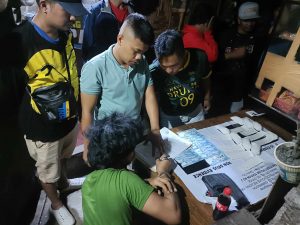DAVAO CITY – It would take “months or even years” to feel the impact of the 7 p.m. to 5 a.m. curfew in Davao City that was reimposed to control the spread of the coronavirus disease (COVID-19), a health official said.
Mayor Sara Duterte reimposed the 7 p.m. to 5 a.m. curfew and liquor ban effective October 15, and a 24/7 liquor ban last November 2, to control the spread of COVID-19.
During a virtual press briefing on Wednesday, Dr. Ashley Lopez, focal person for COVID-19 of the Department of Health (DOH) in Davao City, said it would take time for the measure to bear fruit.
“We cannot conclude any premise just yet in two weeks’ time. Probably, its result will come in time—probably months or even years. The impact is long-term. This is not short-term, and is not for two weeks. So, you will realize the efforts of the mayor will come probably in several months,” he said.
But Dr. Jack Estuart, a Davao City-based medical practitioner who noted that the city did not see a reduction in the number of cases weeks after it was implemented, called for an assessment of the policies.
“What can be done to significantly reduce the number of contacts individuals make outside of home and work to have an impact on incident cases? Self-regulation?” Estuart said.
“Was the 7 p.m.-5 a.m. curfew even effective? Two weeks after it was reimposed, we did not see the hoped for reduction. Cases even surged,” he said.
“So, where and when do the local transmissions happen? Who transmits the virus? Homes? Work place? Office hours? Indoor restaurant dining? Gyms? Commute? Parties? Can we just, once again, all stop for a while, all over again? Stricter local, regional even national lockdown?” he said.
“To make an executive call is tough indeed. To assess their impact is as tough as it is necessary,” he said.
Lopez said Duterte reimposed the curfew to address the primary problem of mass gathering.
“The reimposition of curfew shocked everyone. Each of them bought liquors to take advantage of the situation and thus it created a panic—I don’t know if you call it a panic. That is only the initial reaction but, in the long run, there is going to be a positive result for this one,” he said.
He added the “ultimate goal” of the mayor is not just to control but to stop the spread of the virus.
“The ultimate goal of the mayor is to eliminate (COVID-19) and there’s nothing you can do, except to cooperate because if the people and our community will not cooperate, nothing will happen if everything comes from the government,” he said.
The city, considered the epicenter of the outbreak in Mindanao, is seeing a record number of new COVID-19 cases daily despite the reimposition of stricter measures to control the non-essential movements of people.
As of November 5, the DOH-Davao reported 6,090 cases with 1,696 active ones, 4,175 recoveries and 219 deaths. Of the total, 4,189 were reported in Davao City, 320 in Davao de Oro, 660 in Davao del Norte, 455 in Davao del Sur, 105 in Davao Occidental and 361 in Davao Oriental. (Antonio L. Colina IV/MindaNews)




